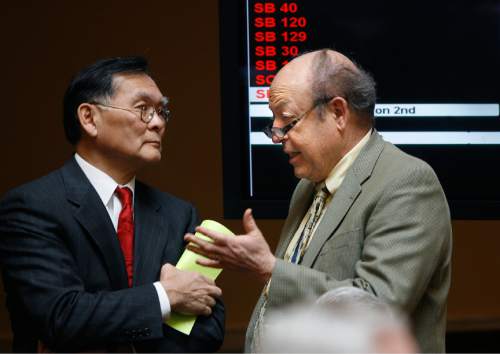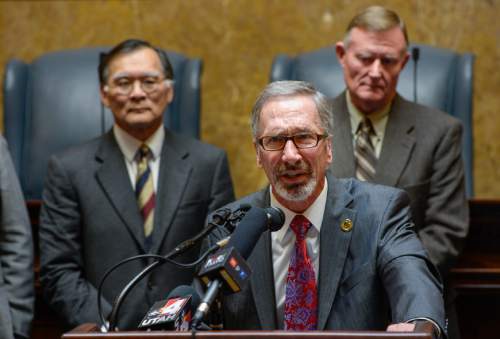This is an archived article that was published on sltrib.com in 2015, and information in the article may be outdated. It is provided only for personal research purposes and may not be reprinted.
Gov. Gary Herbert's Healthy Utah plan on Wednesday got its first good news of the legislative session: a Senate committee recommended the bill that would enact his Medicaid expansion effort.
The Senate Health and Human Services Committee voted 4-1 for SB164, proposed by Sen. Brian Shiozawa, R-Cottonwood Heights. It would extend health insurance to an estimated 95,000 low-income Utah adults, two-thirds of whom can't get subsidies under the Affordable Care Act or qualify for Medicaid.
Sen. Allen Christensen, R-North Ogden, is a member of the committee but left the room before the vote. His own bill, SB153, would extend health insurance to an estimated 10,000 people who are both poor and medically frail.
"It's the first step," Shiozawa, a physician, said afterward.
Last year, Shiozawa's Medicaid expansion bill passed the full Senate but failed in the House.
The only Medicaid expansion bill proposed so far in the House was introduced Wednesday. HB307, proposed by Rep. Robert Spendlove, R-Sandy, would extend existing Medicaid benefits to those in the coverage gap, an estimated 63,000 adults, but only if the Obama administration gives Utah the maximum federal match. That notion was repeatedly rejected by the Obama administration during negotiations last year, the Herbert administration has said.
The vote for SB164 came late in a day in which Healthy Utah dominated two long committee hearings.
In the morning, the Social Services Appropriations Subcommittee heard from 24 proponents of Healthy Utah. Business groups from manufacturing to mining to retail endorsed Healthy Utah, as did doctors, the Utah Hospital Association, and people who told their own wrenching stories of delayed medical care complicating their lives and taking the lives of others.
It was only in the afternoon that opponents showed up.
The Utah Taxpayers Association's Billy Hesterman told the Senate Health and Human Services Committee that SB164 would make Utah further dependent on Obamacare and could potentially burden taxpayers with unforeseen costs.
Derek Monson of the Sutherland Institute predicted Healthy Utah would add to the "difficulties and suffering" of those on traditional Medicaid because doctors and other providers would put the expansion population ahead of them in the line for services.
Cherilyn Eagar warned that Healthy Utah would undermine the free market and help President Obama achieve a single-payer system. She also said that Congress is likely to overturn the Affordable Care Act, a move Shiozawa noted would be vetoed successfully by Obama.
SB164, Eagar said, "pins its hopes on the false and empty hopes of free federal money."
But the overwhelming testimony at both committees was for SB164, which supporters described as the most economical way to cover a large number of Utahns who presently have no health care insurance.
Herbert's plan, negotiated over several months with the Obama administration, would be funded entirely by the feds at first, and Utah's share would rise to 10 percent in 2020.
Utah would have to cover 30 percent from the start if it covers only "frail" Utahns — low-income people considered persistently sick, addicted or mentally ill.
The difference in money coming back to Utah from the federal government is stark, Shiozawa said: $3.2 billion under Healthy Utah over the first five years versus $300,000 under Christensen's SB153.
By 2021, Utahns and Utah businesses will be sending more than $700 million in Affordable Care Act taxes to Washington each year, and Healthy Utah is a way to get much of it back, he said.
Lane Beattie, president of the Salt Lake Chamber, said the chamber's 8,700 members support Healthy Utah because "it's the best we've seen" to address the medical needs of thousands of Utahns.
Greg Bell, president of the Utah Hospital Association, a former lawmaker and lieutenant governor, reminded lawmakers that Intermountain Healthcare, the state's largest medical provider, supports Healthy Utah. He also read a statement from The Church of Jesus Christ of Latter-day Saints, issued the day the church's presiding bishop stood with Herbert at a pro-Healthy Utah press conference.
"If we don't do this, who will?" Bell asked.
"The churches? They don't have the resources. The charities? … Try to get volunteer brain surgery."
Earlier in the day, Utah Episcopal Bishop Scott Hayashi urged lawmakers to put aside politics aside and support Healthy Utah.
"This is our chance to show the DNA of Utah is a DNA of compassion," Hayashi said.
Aileen Clyde, a former leader in the General Relief Society for The Church of Jesus Christ of Latter-day Saints, also spoke for Healthy Utah.
Health care costs are more than the uninsured can afford, she said. "That is human sacrifice and it is not a solution," Clyde said.
Wendy Hendley, a college student and single mother of four, told lawmakers she falls in the coverage gap — too poor for subsidized insurance, but making too much for Medicaid.
Healthy Utah — but not SB153, meant to cover the "medically frail" — would help her, she said.
"People who are your constituents suffer in silence," Hendley said.
A coalition of health advocacy organizations ranging from the American Cancer Society to the American Lung Association announced a new alliance to press for Healthy Utah's passage. The alliance is calling itself Providing Utahns Smarter Healthcare, or PUSH.
Twitter: @KristenMoulton





